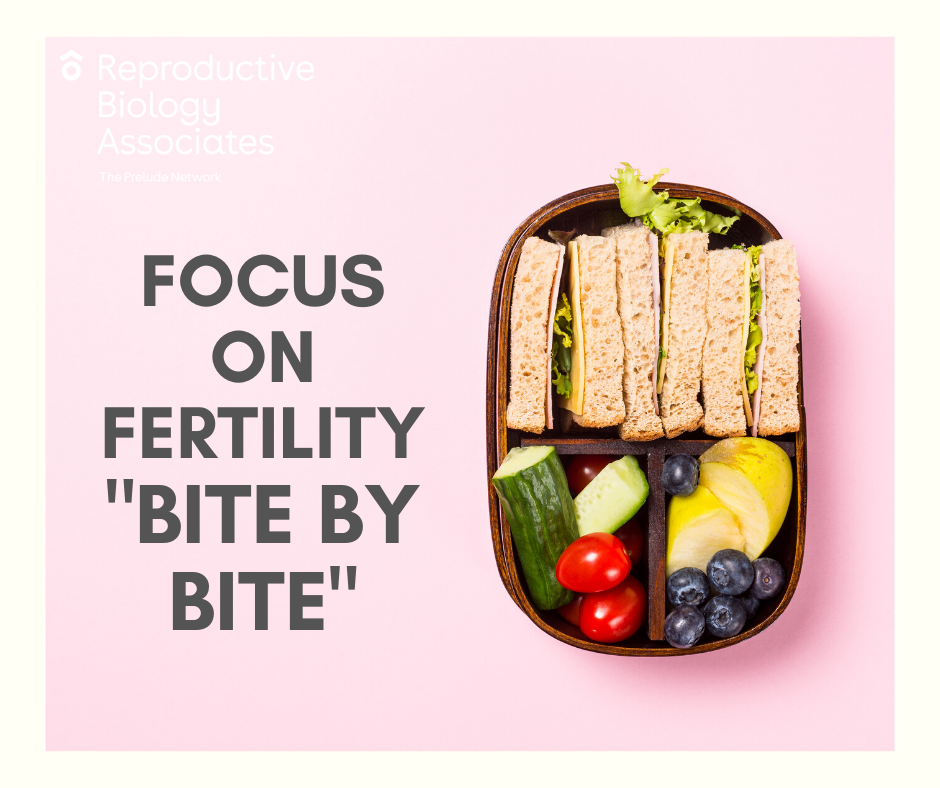March Blog: Fertility & Nutrition
Posted on March 23, 2020
By: Carrie Mueller, MS, RDN, LD, CDE
Registered Dietitian Nutritionist
Priority Health and Nutrition, LLC.
Focus on Your Fertility “Bite by Bite”

Try these 5 simple ways to make your eating habits more fertility friendly.
-
Go Green! - Dark leafy green vegetables, asparagus, and avocados are all naturally good sources of folate and iron which helps prepare the body for a healthy pregnancy. Green leafy vegetables like kale and spinach also contain elements necessary for estrogen metabolism. It can be simple to incorporate more greens into your diet. Try adding spinach or kale to your smoothies, eggs, pasta dishes, or casseroles. Of course, going beyond green and eating a rainbow of fruits and vegetables daily will have the most benefit to a healthy body. Fill half your plate with a variety of fruits and vegetables every meal. And instead of choosing premade processed snacks, grab a serving of fresh fruit or veggies with hummus instead.
-
Make Half Your Grains Whole Grain – Studies have shown that ovulatory infertility is significantly more common in women with high intakes of refined grains (white bread, white rice, highly processed cereals and snacks). Instead, eating complex carbohydrates like quinoa, brown rice, barley, and oats have been shown to improve sperm quality, stabilize blood sugars, and help prevent hormonal fluctuations that impair fertility. Not to mention, whole grains are also excellent sources of Vitamin E, fiber, and fertility friendly B vitamins.
Start simple by mixing some brown rice or quinoa into your white rice or replacing half your white pasta with whole grain pasta. Oats are my favorite for incorporating into your existing recipes. I’ll add them into my meatloaves and meatballs, blend them up to make oat flour for pancakes and breads, or add them into some favorite desserts. And if you get late night snack cravings, popcorn is a natural whole grain and a much healthier alternative to chips or pretzels. -
Got (Whole) Milk? – Studies show that eating or drinking full-fat dairy products in moderation may support female fertility. This means women hoping to become pregnant may benefit from eating one to two servings of full-fat dairy per day. You can try adding whole milk to your tea, use whole milk in a smoothie, snack on a full-fat Greek yogurt, or enjoy an ounce of regular cheese. Keep in mind, however, that these benefits do not translate to male fertility. In men, full fat dairy products seem to decrease sperm concentration and motility and it’s recommended men only consume low-fat dairy sources in moderation.
-
Fertility Friendly Fats - As you are preparing your body for pregnancy, stick with heart healthy unsaturated fats from plants and fatty fish sources. Salmon, tuna, Atlantic mackerel, oysters, mussels, sardines, and trout are all considered fatty fish that contain high amounts of healthy omega-3 fatty acids which reduce inflammation, protect the integrity of eggs and sperm, and help improve fertility. Eating 2-3 servings of these fatty fish weekly is considered safe both prior to and during pregnancy.
In addition to omega-3’s, researchers at the Harvard School of Public Health noted that women who ate the most monounsaturated fat during the IVF cycle were 3.5 times more likely to have a successful pregnancy and live birth. Monounsaturated fats include nuts, seeds, olive oil, peanut oil, canola oil, and avocados.
It’s important to note, not all dietary fats are beneficial for fertility. It’s strongly recommended you avoid all foods containing artificial trans fats, not only for the purpose of enhancing your fertility, but also for chronic disease prevention. Trans fats are man-made fats found primarily in shelf-stable and highly processed foods (many commercial baked and snack foods, stick margarines and shortening, some non-dairy coffee creamers, foods made with partially hydrogenated oils, and some animal products). In fact, it’s so unhealthy that in recent years, the FDA has prohibited manufacturers from adding the major source of artificial trans fat (partially hydrogenated oils) to foods and beverages. While this helps reduce most of our exposure to trans fats, many of these products will remain on the market until they expire as this regulation takes place. Therefore, always check your ingredient lists and ensure products you’re buying do not contain partially hydrogenated oils.
- Picking the Right Proteins - The 2015-2020 Dietary Guidelines for Americans recommended an increased focus on a Mediterranean plant-based diet which is heart healthy and supports current fertility research as well. A Mediterranean diet is rich in nuts, seeds, fish, legumes, antioxidants, and is the type of diet most linked to healthy reproductive functioning for both men and women. Cutting back on animal-based proteins, particularly red meat, in favor of leaner cuts and plant-based proteins have shown a reduced risk of infertility. Try to keep your animal protein sources (beef, pork, poultry) to no more than 6oz/day. Make small changes moving yourself towards a plant-based style of eating, including proteins such as beans, lentils, nuts, seeds, and quinoa. Challenge yourself to try a meatless dish for dinner one night a week. Soy foods, in moderation, are a great protein option for both males and females.
While some past research studies have linked soy with fertility concerns, your need to avoid it will depend upon hormone levels. In patients who are estrogen dominant, it would be recommended to avoid, however, it may prove to be beneficial to others that have low estrogen levels, so it’s important you work with your Physician and Registered Dietitian to determine if this should be a concern for you before eliminating this protein source from your diet.
While many things may feel out of your control regarding your fertility, your eating habits doesn’t have to be one of them. By focusing on these five areas of nutrition, you can get closer to your fertility goals. Challenge yourself to cook more and eat whole foods over heavily processed items or fast foods. With every “Meatless Monday” dish you try, every whole grain added to a family favorite, and every processed snack you replace with fresh produce, you are making those “bite by bite” changes that add up to a greater chance for success. Remember that nutrition doesn’t have to be overwhelming. If you need further help, no matter what your nutrition goals are, seek out a Registered Dietitian Nutritionist specialized to serve your unique needs.


